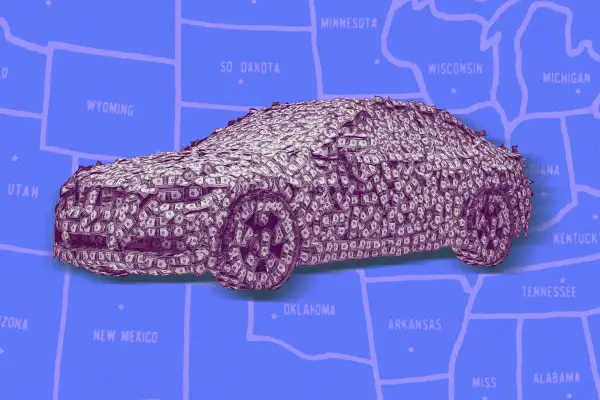Your Next Car Could Cost 10% More Thanks to Trump's Tariffs

Auto tariffs set to go into effect this week could have sweeping impacts across much of the auto industry, resulting in higher prices for consumers.
Some of the best-selling cars would be hit with 25% levies under President Donald Trump's latest plan for a universal tariff on all imported vehicles, assuming it actually goes into effect. Tariffs on some imported car parts that would affect the price of domestic vehicles are scheduled to take effect on May 3. That means car repair and auto insurance costs — two things that have already been hit hard by inflation — could be headed even higher.
The tariffs could boost car prices by 5% to 10%, according to forecasts from analysts and industry experts. Arthur Laffer, an economist who was recognized by the president with a Presidential Medal of Freedom in 2019, wrote in an analysis obtained by the Associated Press that tariffs could drive up the cost of cars by $4,711 — but it depends on whether the tariffs ultimately apply to car parts from Canada and Mexico.
Last year, 46% of all new cars sold were assembled outside the U.S., according to S&P Global. "Volvo, Mazda, Volkswagen and Hyundai Motor (including Genesis and Kia) imported at least 60% of their respective U.S. sales in 2024," S&P Global said in a forecast on tariff impacts. Car companies say they have been planning for tariffs, in some cases increasing U.S. inventories while also exploring supply chain and manufacturing changes to mitigate exposure. But there's only so much they can do in the near term.
Even brands with extensive U.S. manufacturing are vulnerable. Toyota and Honda import many of their wildly popular RAV4s and CR-Vs, respectively, from Canada. Toyota makes its Tacoma in Mexico, and Chevrolet's Trax is assembled in Korea, among many other examples.
"Consumers likely have a narrow window to buy new or used vehicles before prices increase by 10% or more," Cox Automotive's chief economist, Jonathan Smoke, said in a report.
Auto tariffs: How much will car prices rise?
The president's tariff plans could still shift or evolve. It's happened before. Trump says he's looking for concessions of "great value" from other countries in order for him to consider changing his mind on tariffs, which he hopes will revitalize the U.S. auto industry.
On Saturday, the president denied a report that he had told car makers not to raise prices, telling NBC it's fine if foreign car companies raise prices because consumers won't buy their cars. Instead, he predicts they'll shop American.
"The automakers are going to make a lot of money — the American automakers," Trump then told reporters on Air Force One Sunday, adding that international automakers could make money too if they build cars here. "Outside of the United States, that's going to be up to them. I don't care too much about that."
However, automakers would likely also increase prices on vehicles assembled in America if their competitors' prices for foreign cars spike due to tariffs costs. "The tighter supply and higher prices we expect will be reminiscent of 2021," Smoke said. Back then, COVID-era manufacturing disruptions led to huge drop in dealers' inventories and vehicle affordability plummeted.
Plus, American cars contain parts from all over. "The average domestic content is conservatively estimated at only 50% and is likely closer to 40% American-made components," a White House fact sheet.
According to Edmunds, tariffs could make it harder to find discounts on new cars. Automakers can reduce or eliminate financing incentives and cashback rebate offers to increase prices without necessarily increasing their sticker prices.
The potential impact of auto tariffs is still difficult to assess due to the political unknowns about what the tariffs will look like and how long they'll last. For example, the administration is still determining how tariffs could eventually apply to car parts from Canada and Mexico that are used in cars assembled in the U.S.
Car prices aren't the only thing that will be touched by auto tariffs, Smoke emphasized in the Cox report. "With 25% increases in the cost of parts, inflation would surge in maintenance and repair and insurance, which vehicle owners are already struggling to handle."
Automakers are lobbying for exemptions or delays to the tariffs, and some are trying to curry favor with the president by pledging to do business in the U.S. Notably, Hyundai announced a $21 billion investment to increase manufacturing in the U.S. from 2025 to 2028.
More from Money:
5 Best Auto Refinance Companies of 2025
10 Everyday Items Trump's Tariffs Could Make Pricier
Higher Prices Ahead? CEOs Reveal Plans to Handle Trump’s Tariffs
